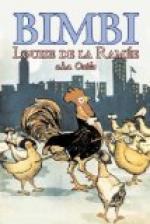The dealers undid the shutters, scaring the redbreast away, and then tramped about in their heavy boots and chattered in contented voices, and began to wrap up the stove once more in all its straw and hay and cordage.
It never once occurred to them to glance inside. Why should they look inside a stove that they had bought and were about to sell again for all its glorious beauty of exterior?
The child still did not feel afraid. A great exaltation had come to him: he was like one lifted up by his angels.
Presently the two traders called up their porters, and the stove, heedfully swathed and wrapped and tended as though it were some sick prince going on a journey, was borne on the shoulders of six stout Bavarians down the stairs and out of the door into the Marienplatz. Even behind all those wrappings August felt the icy bite of the intense cold of the outer air at dawn of a winter’s day in Munich. The men moved the stove with exceeding gentleness and care, so that he had often been far more roughly shaken in his big brothers’ arms than he was in his journey now; and though both hunger and thirst made themselves felt, being foes that will take no denial, he was still in that state of nervous exaltation which deadens all physical suffering and is at once a cordial and an opiate. He had heard Hirschvogel speak; that was enough.
The stout carriers tramped through the city, six of them, with the Nurnberg fire-castle on their brawny shoulders, and went right across Munich to the railway station, and August in the dark recognized all the ugly, jangling, pounding, roaring, hissing railway noises, and thought, despite his courage and excitement, “Will it be a very long journey?” for his stomach had at times an odd sinking sensation, and his head sadly often felt light and swimming. If it was a very, very long journey, he felt half afraid that he would be dead or something bad before the end, and Hirschvogel would be so lonely: that was what he thought most about; not much about himself, and not much about Dorothea and the house at home. He was “high strung to high emprise,” and could not look behind him.
Whether for a long or a short journey, whether for weal or woe, the stove with August still within it was once more hoisted up into a great van; but this time it was not all alone, and the two dealers as well as the six porters were all with it.
He in his darkness knew that; for he heard their voices. The train glided away over the Bavarian plain southward; and he heard the men say something of Berg and the Wurm-See, but their German was strange to him, and he could not make out what these names meant.
The train rolled on, with all its fume and fuss, and roar of steam, and stench of oil and burning coal. It had to go quietly and slowly on account of the snow which was falling, and which had fallen all night.
“He might have waited till he came to the city,” grumbled one man to another. “What weather to stay on at Berg!”




